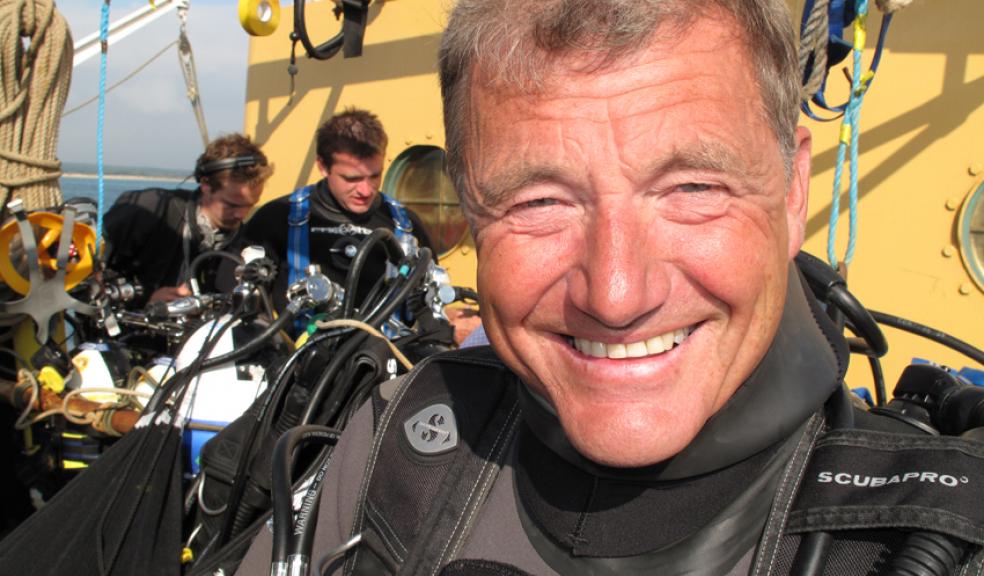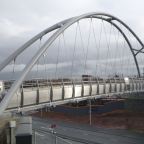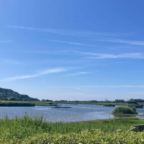
Paul Rose: A lifetime dedication to the oceans
The Ecover Blue Mile’s best known supporter, Paul Rose, talks about why he loves the event so much and what we can all do to ensure our oceans have a brighter future.
When it comes to oceans and polar exploration, there’s not much that Paul Rose hasn’t done. Paul has some 8,000 ocean dives under his belt, was base commander at Rothera Research Station in Antarctica for 10 years and was awarded the Queen’s Polar Medals for his work in the Arctic and Antarctica. He is one of the most pre-eminent divers and polar experts in the world today, supporting and leading scientific missions with the aim of protecting the marine environment for future generations.
As if all this wasn’t enough to keep him busy, he also manages to fit in time to perform the role of vice-president of the Royal Geographical Society and present TV programmes including the BBC documentary series, Oceans. Oh, and he takes part in sailing races too, including the 2011 Rolex Fastnet.
This year, his two main focuses have been on working for more Marine Protected Areas globally and on raising awareness about the amount of debris – in particular plastic – that is entering our seas and causing damage to the environment and wildlife.
He recently returned from a six week National Geographic expedition to Franz Josef Land in the Russian Arctic, a remote archipelago that harbours a wild ecosystem that includes polar bears, walruses, whales, seals, and large nesting colonies of seabirds. The expedition’s aim is to compare its current state with historical scientific baselines and photographs obtained by explorers in the late 1800s. The scientific results will inform the management and conservation of the area.
The trip was part of National Geographic’s Pristine Seas project: “We have expeditions to key areas of the planet and make a film or a documentary and a huge amount of science is carried out to enable that area to become protected” explained Paul.
“With only 2% of the world’s oceans being protected at the moment, I’m on a big Marine Protected Areas campaign. When an area is protected, it rebuilds very quickly. That’s good for the marine environment and we also end up getting more fish and a better economy as a result. It’s completely sustainable. It’s a win-win. So we do desperately need much more of the world’s oceans to be given protected status.”
In June, Paul was a guest speaker at two international conferences held in Hong Kong – Plasticity, which looked at creative, sustainable developments in re-using plastics and Ecozine, which focused on the environmental awareness of the material. He has also worked on a BBC documentary, Plastic Oceans, and held a debris dive at Lake Windermere.
“I’ve been working very hard on ocean debris,” said Paul. “From a consumer point of view, we can all do a lot to help – by becoming aware of the issue and by looking at what we do in our daily lives in terms of disposing of our waste. Each of us can make an enormous difference.”
Many of Paul’s projects bring him to Plymouth Marine Laboratory and Plymouth University, where he has forged links with some of the world’s leading marine scientists. And he has been working alongside Ecover Blue Mile’s title sponsors this year, chairing a forum with the ecological cleaning product company and a group of NGOs to discuss sustainable packaging.
Paul will be in Plymouth for the Ecover Blue Mile on 14-15 September, when hundreds of people will be taking to the water.
“I’m a huge supporter of the Ecover Blue Mile. Firstly, it’s fun! And I think that if it’s fun, you can capture people’s imagination. This is the key thing in working up environmental messaging: how do we get people to engage easily? What better way than having fun. So it’s perfect. It’s physically challenging without being out of anybody’s reach and you can do it in a number of different ways – by swimming, stand up paddling or kayaking the Blue Mile.
“And it’s in THE iconic ocean site in Britain – Plymouth.”
Paul is taking part in the Corporate Team Challenge for the Ecover Blue Mile team, doing the kayaking leg of the race, which also includes swimming and stand up paddle board legs – each of the disciplines are over a one mile course off Plymouth’s Barbican on the Saturday afternoon of the two-day event. That evening, he’ll be delivering a few words at the Gala Dinner at the Boathouse Café, a fundraising event for the Ecover Blue Mile’s chosen charity, the Marine Conservation Society.
“The Ecover Blue Mile is a perfect blend of global environmental messaging, fun, fitness and a very smart social approach to doing something locally that has a big global impact,” said Paul “It’s great – and I’m in for life!”
So can he ever foresee a time when he will no longer be diving or exploring? “For sure not! I love the sea and have done all of my life; it’s the sea that defines me. In fact, as time is moving on and I’m coming into my prime I’m seeing the water as being the place for me. I can see that the future is even brighter, with much more of it to look forward to.
“And I really do believe that the future is brighter for the oceans, too. The solutions that are coming up, particularly from the next generation, are really, really creative. As we start to value plastic because of the creative new ways of re-using it, we stop throwing it away. And there are also some very clever ideas coming forward now in how we can safeguard our oceans.
“I was just speaking at the European Marine Science Educators Conference in Plymouth and I bumped into an old colleague who was telling me about whale poo! One of the geo-engineering solutions is to put iron into the ocean because of the chemical effect it has with absorbing CO2 and reducing acidification. Whale poo contains a lot of iron and has a very positive effect on the environment so one way of geo-engineering the ocean without putting chemicals in is to get more whales – and we’d get more whales if we stopped hunting them.
“We’ve got all these things going on and so the future for the oceans is bright – but we need to be careful because it’s only bright with our efforts. It isn’t bright if we just do nothing; if we do nothing, we are going to lose coral reefs; if we keep over-fishing we are going to completely destroy the eco-system. So yes, the future is bright – but only if we keep the pressure up.”

















